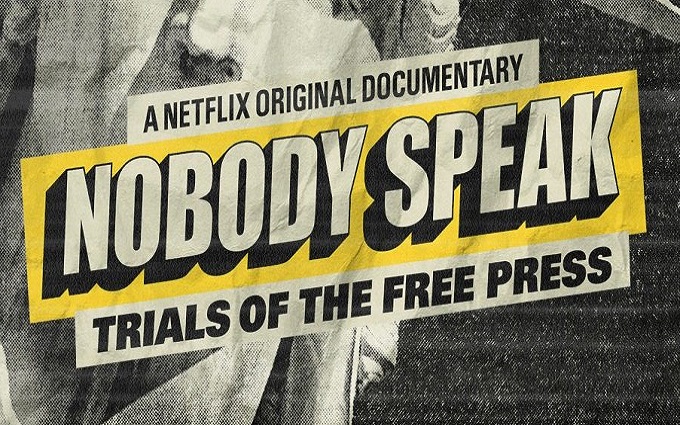Nobody Speak : Trails Of The Free Press Review

The Plot
A Netflix original documentary exploring Hulk Hogan’s successful $140 million sex tape lawsuit of celebrity gossip website Gawker and the supposed threat to free speech posed by Billionaires and the Donald Trump presidency.
The Good
Although from its title this documentary is clearly crafted to promote a very specific agenda, amongst its heavy editorial bias there’s enough raw information and extensive access to allow audiences to learn much about principal figures on both sides of the high profile Hogan legal drama. Lawyers, journalists and public figures all touch upon a number of important issues in their various testimonies even if the film inevitably then drifts back to its evil billionaires theme.
The Bad
The film’s attempts to sustain a credible narrative that American free speech and the entire global industry of professional journalism is somehow at urgent risk of dire destruction by sinister billionaires is patently absurd and transparently self-serving. Listening to the former staff of a notoriously tasteless celebrity gossip site and a regional newspaper shamelessly self-aggrandise themselves as heroic victims against totalitarian oppression is at least fascinating viewing.
Sadly the film mostly squanders the opportunity to truly explore the complex legal and social issues surrounding the innate conflict between freedom of speech and privacy in an increasingly digital world. Instead the film choses to make billionaire boogeymen the overwhelming focus of its badly lopsided editorial drive.
The fact that tech billionaire Peter Thiel helped finance Hogan’s legal costs due to his own long standing objection to the type of journalism Gawker represented isn’t the sensational smoking gun the filmmakers clearly imagine it to be. It’s not illegal or unethical and it’s ultimately entirely irrelevant to the legitimate legal process that lead to Gawker being successfully sued for recklessly and stubbornly publishing a ‘sex tape’ obtained under questionable circumstances.
What hotel Hogan’s lawyers stayed at or who paid for their room is meaningless trivia that has absolutely nothing to do with hysterically proposed concepts of a ‘broken legal system’ and the ‘death of fee speech’.
Likewise Hogan’s successful lawsuit against Gawker has absolutely nothing to do with the purchase of a regional Las Vegas newspaper by a wealthy family or hypothetical fears surrounding the Trump presidency. The film tries desperately to tie these three unrelated events together in a portrait of billionaires dangerously stifling media scrutiny.
What the film deliberately chooses to ignore is that a digital world where information can be instantly disseminated globally without cost or censorship of any kind is both an indestructible guarantee of free speech and ironically the only real threat to print and broadcast journalism. A world where people communicate without borders sharing primary audio-visual materials is one in which the importance of traditional media institutions is vastly diminished if not entirely irrelevant.
What’s actually interesting about the Gawker case is how it represents the inevitable conflict between current legal systems, established social norms and the mostly lawless ‘wild west’ of our online lives. Where those new lines in the sand are drawn between free expression and personal privacy are a challenge for the judiciary, journalists and society as a whole. Important practical questions that can’t be resolved merely by being ignored or by attempting to further vilify the wealthy elite.
The Ugly Truth
Nobody Speak is a transparently one sided exploration of some genuinely interesting subject matter. It’s just a shame the filmmakers chose to use such extensive source material to merely pander to populist loathing for the wealthy ‘1%’ rather than actually address the real challenges facing journalism and the legal system in a digital world.
Review by Russell Nelson